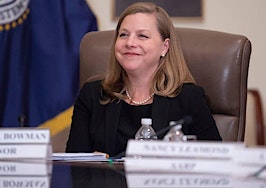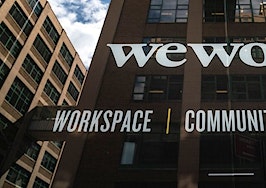No one can predict the future of real estate, but you can prepare. Find out what to prepare for and pick up the tools you’ll need at Virtual Inman Connect on Nov. 1-2, 2023. And don’t miss Inman Connect New York on Jan. 23-25, 2024, where AI, capital and more will be center stage. Bet big on the future and join us at Connect.
Since at least 2011, The Trump Organization has inflated real estate values, manipulated financial reporting and even deployed what Donald Trump himself described as a “worthless clause” in statements that he presumed, falsely, would allow his company to wipe its hands of dishonest valuations, according to testimony in the former president’s civil fraud trial, which began Monday.
But for millions of investors on the straight and narrow, the fine line between Trump’s alleged fraud and murkier aspects of valuing and reporting real estate assets is always present, if not totally clear, lawyers and investors told Inman.

Thad Wong | Christie’s International
“It’s like you’re incentivized to value the building at the lowest value,” Thad Wong, a real estate investor and co-CEO of @properties Christie’s International Real Estate, acknowledged to Inman, referring to the pressure that compels many investors to adjust valuations depending on if the information is destined for a potential buyer’s agent, a lender, insurer or the Internal Revenue Service.
“You’re trying to create a different narrative for a property to have a higher value so that when your lender is looking at it they’re going to give you a better loan package or a better term,” Wong added.
New York Judge Arthur Engoron ruled last week that by ignoring independent valuations of multiple properties in his sprawling portfolio in recent years, Trump inflated his net worth by as much as $2.2 billion, joining a list of real estate investors who crossed the line into fraudulent conduct. New York prosecutors said the former president therefore received a range of benefits based on faulty information about buildings in his real estate empire.

Bennett Gershman
But while Trump’s case may be among the most flagrant, the former president is only the latest investor to violate state or federal laws through aggressive pricing tactics, Bennett Gershman, a law professor at Pace University and a former New York prosecutor, told Inman. However, Trump’s fraud trial may reveal just how far investors can stray before they’re exposed to similar legal repercussions.
“This case with Trump is really breathtaking in that you don’t see a large-scale developer or real estate operator engaging in such a long-standing fairly transparent documentation that astonishingly raises the values,” he said. “We’re not talking about minor inflation or overvaluing. This overvaluing is massive.”
As Trump’s trial proceeds, investors and attorneys walked Inman through the legal traps investors face when they seek to report and value real estate assets.
Who says what a building is worth?
There’s an adage in real estate: A home or a building is worth what the market will pay for it. On the surface, that’s true for both residential and commercial real estate.
Commercial real estate is a bit different from residential real estate in the way that buildings are valued, said Chad Littell, national director of capital markets analytics for CoStar.

Sept. 16, 2023, USA, New York: The Trump Tower on 5th Avenue in Manhattan. Photo: Michael Kappeler / dpa (Photo by Michael Kappeler/picture alliance via Getty Images)
“If you’re buying a residential home, there’s a lot of legislation in there to protect consumers,” Littell said of the industry. “But in the commercial space … there can be very disparate opinions for what a value is for a specific property.”
Commercial real estate relies on opinions of value that are determined by brokerages. But an owner might have a different opinion and think the building is worth more or less.
According to court documents, Trump’s properties were often given estimated values by firms like Cushman & Wakefield, but Trump’s financial statements would put the value several times higher.
40 Wall Street, for instance, was appraised in 2011 and 2012 at between $200 million and $220 million. The Trump Organization listed the value those years at $524.7 million and $527.2 million.
Trump’s Mar-a-Lago resort, which he called the Winter White House during his one term in office, was appraised between 2011 and 2023 at between $18 million and $27.6 million. During those same years, Trump reported the value at between $426.5 million and $612 million.
Lawrence Moens, a Florida real estate broker who represents high-end clients, said Trump’s valuations were “conservative,” according to court documents. Moens said at 2,300 percent higher than appraised value, Trump’s estimate was “below my market estimate for the market value of the property each year,” and that he could quickly find a buyer for Mar-a-Lago around that price.
Engoron agreed with New York Attorney General Letitia Jones, saying Mar-a-Lago’s true value was far lower than Trump reported each year.
New York Attorney General Letitia Jones suggested the Trump Organization overvalued the firm’s buildings by as much as $2.2 billion, or 38.5 percent, between 2014 and 2021, according to the ruling.
The ‘worthless clause’
Trump argued that his financial disclosures included a sort of indemnification statement to protect him from making possibly misleading statements.
In essence, the firm would state the estimated values of assets before adding a statement that the actual value could be different. In a sworn deposition, Trump called it a “worthless clause,” which effectively puts the onus on the lender, buyer or insurance company to conduct due diligence to determine a property’s true value.
“They call it a ‘worthless clause’ too, because it makes the statement ‘worthless,'” the former president said, according to the judge’s order. “I have a clause in there that says, don’t believe the statement, go out and do your own work. This statement is ‘worthless.’ It means nothing.”
Engoron wrote that Trump’s so-called “worthless clause,” itself, was worthless.
“The clause does not use the words ‘worthless’ or useless or ‘ignore’ or disregard or any similar words,” Engoron wrote.
But other experts note that it’s a given that investors will do their own due diligence rather than rely on the seller to find out the true value of a building.
“You’d be laughed at if you publicly admitted you used the seller’s statements and trusted them,” Alexander Goldfarb, a senior equity analyst for the investment bank Piper Sandler, told The New York Times. “Everybody does their own homework.”

Chicago skyline along the Chicago River, Chicago, Illinois. (Photo by: Robert Knopes/Education Images/Universal Images Group via Getty Images
Changing commercial values
Commercial real estate values are priced, in part, by how much money they can generate for the investors who own the buildings, along with a set of macroeconomic factors.
Old office buildings, for instance, are selling at more than half off in markets across the country due to record-low occupancy caused in part by the pandemic and in part by a flight to newer buildings. Those new buildings that can attract tenants, meanwhile, are still fetching high prices.
Investors are looking to generate cashflow from commercial real estate, or monthly earnings from rent and other sources of revenue after accounting for expenses.
One recent case showed how investors can commit fraud by falsifying documents in ways that homeowners can’t commit when selling residential properties to other consumers.
A California real estate executive pleaded guilty to fraud last year after admitting he deceived lenders by inflating the income of properties his company owned, according to the Department of Justice.
Prosecutors said Tyler Ross and employees gave mortgage lenders falsified financial documents that made underperforming properties look more profitable by deleting or reducing actual expenses.
On paper, the buildings looked more profitable than they actually were, giving Ross a better chance to obtain new or favorable terms on loans.
“Honest financial reporting is the foundation of our banking and lending system,” Dawn N. Ison, U.S. Attorney for the Eastern District of Michigan, said in a statement. “My office will not hesitate to prosecute those who lie in order to engage in financial crimes, regardless of the titles they may have.”
Cases such as this one highlight the at-times countervailing forces in real estate.
“Think of how you want to document your income. When applying for a home mortgage, you want to showcase the highest income possible, while when preparing your tax return, you want to showcase the lowest income possible,” Davis said.
Gershman said Trump’s case goes beyond simply seeking a smaller tax bill, a process that is allowed in residential and commercial real estate.
“When you see these kinds of numbers, it’s pretty darn clear what the intention is,” Gershman said. “It’s clear to the attorney general [and] it’s clear to the judge.”
“I have prosecuted a lot of cases. I have to say I have never seen before such a huge overvaluing, such clearly fraudulent misrepresentations,” he added. “It’s not minor. This is something that is so massive that it just is almost breathtaking.”
What happens next?
Last week’s summary judgment could affect whether Trump can conduct business in the state of New York. A civil trial started on Monday to determine whether the former president would have to repay as much as $250 million, and whether he can ever operate a business in New York again.
Monday marked the first day of what could be a months-long trial. Over the next few weeks, Jones is expected to call Trump and several prominent members of his family to the stand to testify.
During opening arguments for the case this week, when the judge will determine whether Trump is on the hook for paying damages, Trump’s attorneys reiterated the basic premise of real estate.
“Buyers have a view, sellers have a view, none of them are wrong,” Trump’s lawyer Christopher Kise said, according to The New York Times.
Trump’s legal team has maintained that the former president didn’t intend to commit fraud and is likely to appeal the ruling.
Get Inman’s Property Portfolio Newsletter delivered right to your inbox. A weekly roundup of news that real estate investors need to stay on top, delivered every Tuesday. Click here to subscribe.














